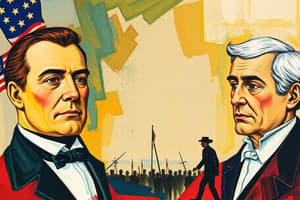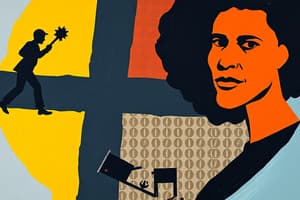Podcast
Questions and Answers
What was the Missouri Crisis?
What was the Missouri Crisis?
- A conflict over Missouri's request to join the union as a slave state. (correct)
- When Missouri entered the union as a free state.
- The repeal of the Missouri Compromise.
- An economic crisis in Missouri.
Who proposed that Missouri be allowed in as a state under specific conditions?
Who proposed that Missouri be allowed in as a state under specific conditions?
James Tallmadge
Who outlined the Compromise of 1850?
Who outlined the Compromise of 1850?
Henry Clay
The Missouri Compromise of 1820 contained three parts: Congress would admit Missouri as a _____ state.
The Missouri Compromise of 1820 contained three parts: Congress would admit Missouri as a _____ state.
Who was the 7th president of the United States?
Who was the 7th president of the United States?
What did the Adams-Onis Treaty accomplish?
What did the Adams-Onis Treaty accomplish?
What was the Nullification Crisis?
What was the Nullification Crisis?
Who was Denmark Vesey?
Who was Denmark Vesey?
What was the Tariff of Abominations?
What was the Tariff of Abominations?
Who secretly drafted the 'South Carolina Exposition and Protest'?
Who secretly drafted the 'South Carolina Exposition and Protest'?
What nickname was given to Martin Van Buren?
What nickname was given to Martin Van Buren?
What did the Force Bill authorize Andrew Jackson to do?
What did the Force Bill authorize Andrew Jackson to do?
What economic event occurred in 1837?
What economic event occurred in 1837?
Who was the Whig candidate for president in 1840?
Who was the Whig candidate for president in 1840?
What was the American Party also known as?
What was the American Party also known as?
Who was Elijah Lovejoy?
Who was Elijah Lovejoy?
Flashcards
Missouri Crisis
Missouri Crisis
Occurred when Missouri sought admission to the Union as a slave state, disrupting the balance of free and slave states. Congress's proposal for the emancipation of slaves in Missouri was rejected, leading to Southern senators withholding statehood for Maine.
James Tallmadge
James Tallmadge
A congressman from New York who proposed that Missouri should only enter as a state if no additional slaves could be brought in and that children of slaves would gain freedom at age 25.
Henry Clay
Henry Clay
A distinguished senator from Kentucky known for outlining the Compromise of 1850, which aimed to address conflicts between slave and free states.
Missouri Compromise of 1820
Missouri Compromise of 1820
Signup and view all the flashcards
Andrew Jackson
Andrew Jackson
Signup and view all the flashcards
John Quincy Adams
John Quincy Adams
Signup and view all the flashcards
Adams-Onis Treaty
Adams-Onis Treaty
Signup and view all the flashcards
Nullification Crisis
Nullification Crisis
Signup and view all the flashcards
Denmark Vesey
Denmark Vesey
Signup and view all the flashcards
Tariff of Abominations
Tariff of Abominations
Signup and view all the flashcards
John C. Calhoun
John C. Calhoun
Signup and view all the flashcards
Martin Van Buren
Martin Van Buren
Signup and view all the flashcards
Force Bill
Force Bill
Signup and view all the flashcards
Margaret Eaton
Margaret Eaton
Signup and view all the flashcards
Second Bank of the United States
Second Bank of the United States
Signup and view all the flashcards
Nicholas Biddle
Nicholas Biddle
Signup and view all the flashcards
Study Notes
Missouri Crisis
- Occurred when Missouri sought admission to the Union as a slave state, disrupting the balance of free and slave states.
- Congress's proposal for the emancipation of slaves in Missouri was rejected, leading to Southern senators withholding statehood for Maine.
James Tallmadge
- A congressman from New York who proposed that Missouri should only enter as a state if no additional slaves could be brought in and that children of slaves would gain freedom at age 25.
Henry Clay
- Distinguished senator from Kentucky known for outlining the Compromise of 1850, which aimed to address conflicts between slave and free states.
Missouri Compromise of 1820
- Arkansas admitted as a slave state while Maine became a free state to maintain balance.
- Divided the rest of the Louisiana Purchase territory at the 36°30' latitude line regarding slavery.
Andrew Jackson
- 7th President of the United States known for successfully defending New Orleans and enhancing presidential power.
John Quincy Adams
- 6th President and son of John Adams; instrumental in acquiring Florida for the United States.
Adams-Onis Treaty
- Agreement with Spain transferring Florida to the United States.
Nullification Crisis
- Conflict during Jackson’s presidency sparked by South Carolina's Ordinance of Nullification, opposing the federal Tariff of 1828.
Denmark Vesey
- Freed slave in South Carolina who planned a slave uprising; executed for his involvement.
Tariff of Abominations
- A protective import tax aimed at supporting Northern manufacturing by raising European product prices in America.
John C. Calhoun
- Authored the "South Carolina Exposition and Protest," presenting the nullification doctrine, secretly laying the foundation for South Carolina's opposition.
Martin Van Buren
- Political strategist from New York known as "the Little Magician"; succeeded Calhoun as vice president under Jackson in 1832.
Force Bill
- Legislation empowering the President to deploy military forces to enforce tariffs.
Margaret Eaton
- Wife of John Eaton, she faced social ostracism from other cabinet wives due to her controversial status.
Second Bank of the United States
- Created to stabilize the economy by ensuring other banks paid their debts in gold, preventing excess issuance of paper money.
Nicholas Biddle
- Director of the Second Bank of the United States, known for his role in its operations.
Panic of 1837
- Economic crisis in the U.S. leading to a significant depression.
Whig Party
- Formed in opposition to Jacksonian Democrats, it advocated for policies to promote economic growth.
William Henry Harrison
- Whig presidential candidate in 1840; portrayed as a simple man, showcased by the slogan "log cabin and hard cider."
John Tyler
- Vice presidential nominee for the Whig Party; later assumed the presidency after Harrison's death.
American Party
- Also known as the Know-Nothing Party, focused on anti-immigrant sentiments.
Freemasons
- A global network of social clubs with historical roots in medieval European stonemasonry, featuring distinctive rituals and practices.
Anti-Masonic Party
- A minor 19th-century political party founded as a single-issue response to Freemasonry, seeking to become a prominent political force.
Nativists
- Americans wary of immigrant influx, fearing job displacement and the establishment of Roman Catholic doctrines.
Elijah Lovejoy
- Abolitionist newspaper editor killed while defending his press, a martyr for the anti-slavery movement.
Studying That Suits You
Use AI to generate personalized quizzes and flashcards to suit your learning preferences.




